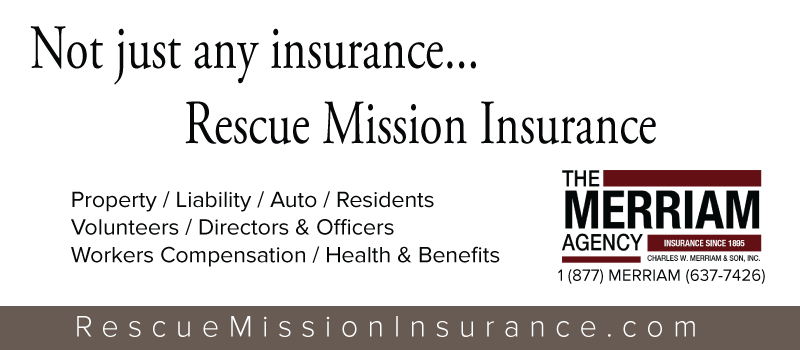
| |
 |
 |
 |
 |
 |
This issue of Street Smart is sponsored by:
|
Ripple Effect to be held in Columbus, Ohio, in February Complete the Compensation Survey to Access the Report for Free
Talk to your CPA to see what your obligation and liability might be.
Looking Down the Street...
|

Nonprofit Grows from Saving 20,000 to 1.2 Million Meals a Year Consider: Are there outlets you could collaborate with in your community to put good, unused food in the stomachs of hungry and homeless people?
|
|
|

Justice Department Criticizes the DEA Regarding the Opioid Crisis
Consider: Does your organization regularly and intentionally take advantage of social media?
|
|
|
|
Breakfast Cook, Seattle's Union Gospel Mission, Seattle, WA Care Support Specialist, Light of Life Ministries, Inc., Pittsburgh, PA Controller, Good News Rescue Mission, Redding, CA Development and Database Coordinator, Union Gospel Mission, Dallas, TX Development Director, Open Door Mission, Glens Falls, NY Development Director, Home of Grace, Vancleave, MS Development Manager, Bread of Life Mission, Seattle, WA Director of Development, Jubilee Ministries, Inc., Lebanon, PA Director of Development, City Mission of Schenectady, Schenectady, NY Director of Marketing and Communications, St. Matthew's House, Naples, FL Director of Residential Ministries, Water Street Mission, Lancaster, PA Donor Relations Director, Seattle's Union Gospel Mission, Seattle, WA Executive Director, Campus of Hope, Conroe, TX Grant Writer, Phoenix Rescue Mission, Phoenix, AZ Guest Services Supervisor, Seattle's Union Gospel Mission, Seattle, WA Major Gifts Director, Union Gospel Mission, Dallas, TX Major Gifts Officer, Union Rescue Mission, Wichita, KS Men's Case Manager, Shreveport-Bossier Rescue Mission, Shreveport, LA Program Administrator - Bridge Street Mission, Bridge Street Mission, Inc., Wausau, WI Residential Coordinator_Cornerstone Manor Facility, Buffalo City Mission, Buffalo, NY Search and Rescue Specialist, Seattle's Union Gospel Mission, Seattle, WA Senior Human Resources Generalist, Seattle's Union Gospel Mission, Seattle, WA Shelter Supervisor, Open Door Mission, Glens Falls, NY Social Ent. Bus. Coor. & Exec. Assist. to COO, John 3:16 Mission, Tulsa, OK Social Work/Clinical Manager, Denver Rescue Mission, Denver, CO Vice President of Development, Career Cross Training, Colorado Springs, CO Vocational Training Manager, Shreveport-Bossier Rescue Mission, Shreveport, LA
|
|
|
Come to me, all who labor and are heavy laden, and I will give you rest. Take my yoke upon you, and learn from me, for I am gentle and lowly in heart, and you will find rest for your souls. For my yoke is easy, and my burden is light.”
—Matthew 11:28-30 ESV
The word yoke can be foreign to us these days. Basically, a yoke is a piece of wood that is used to hold two animals—usually oxen—together to help them share the burden in handling their load. The key is that the yoke allows the animals to support each other in pulling the heavy weight.
As we live our lives, we are often times yoked to many things. We might be yoked with a personal decision that is weighing heavy on us. We might even be yoked with a spouse who helps us in the hard times. We can even be yoked to sin as the Israelites were with Baal (Numbers 25:3). No matter how you look at it, we are yoked to something, whether good or bad.
Jesus tells us to come and take His yoke and we will find rest. Interestingly, Jesus doesn’t say He will take our burdens and attach His yoke to it as we stand by and watch. No, He takes us under His yoke and carries those burdens with us along the way.
In turn, He takes the majority of the burden and makes it “light” for us. We also “learn” from Jesus as we carry the burden with Him. This allows us to learn to change from the inside instead of repeating the same wrong things over and over. Is there something pulling you down that you haven’t given to Jesus today?
Used by permission from www.shortdailydevotions.com
To contribute: If you would like to write a devotional thought for StreetLight, please make it about 200 words and include at least one Bible verse or passage, and submit via email.
Citygate Network is a nonprofit organization committed to furthering missions and kindred ministries. Citygate Network provides limited space in "Market Street" for advertising opportunities, services, and products to advance the cause of rescue missions. Citygate Network is not responsible for the claims made by its advertisers and reserves the right to select or reject any advertising, in the sole discretion of Citygate Network, for any or no reason.
PRIVACY: Protecting your privacy is very important to us at Citygate Network. We will not rent, sell, or exchange your e-mail address with a third party for any purpose.
All Scripture quotations taken from the HOLY BIBLE, NEW INTERNATIONAL VERSION, unless otherwise noted. Copyright © 1973, 1978, 1984 International Bible Society. Used by permission of Zondervan Bible Publishers.
Street Smart is sent to you as a member service of Citygate Network, and is published on the 1st and 15th of each month (unless those dates fall on a weekend or holiday). The content does not necessarily represent the views of or imply endorsement by Citygate Network. To submit items for publication, email editor@citygatenetwork.org. To unsubscribe, email unsubscribe@citygatenetwork.org.





